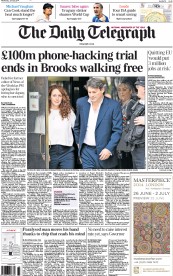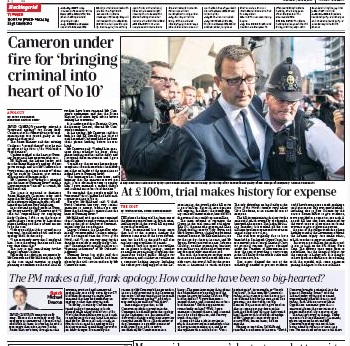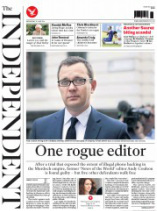Hacking trial: press coverageDaily TelegraphWednesday 25 June, 2014
The Telegraph's distaste for the entire proceedings is apparent from the word go, with emphasis on the cost and length of the trial taking precedence over the verdicts. Coulson's conviction is mentioned almost as an aside in the fifth par. Perhaps the most extraordinary sentence comes a couple of pars later: "Despite the acquittals, the police investigation showed no signs of abating last night, with detectives planning to interview Rupert Murdoch, the News Corp chairman, and his son James as suspects." Despite the acquittals? Not only was Coulson convicted, but five others have pleaded guilty and will be sentenced with him next week - a fact that is not mentioned until near the end. The paper also broke the embargo on the costs of the trial. 
The Telegraph goes straight into its inside coverage on page 2 with a spread on the five acquittals. The main story is naturally angled on Rebekah Brooks, but it is written not by the crime correspondent Martin Evans, but by Philip Johnston. It is a most unusual piece of writing to appear on a news page - under the equally unusual label "anatomy" - as this series of excerpts shows.
The biggest police investigation of recent times had failed to land a single blow on the central figure in the affair. The Wicked Witch, as Private Eye lampooned her, was not so wicked after all. And while some former NI journalists — notably Andy Coulson, the former Downing Street communications chief — were convicted or pleaded guilty to intercepting communications, many of the most serious charges were thrown out by the jury. It is impossible not to conclude that the response of the police, prosecutors and the Government to what was undoubtedly an unedifying episode in the annals of British newspapers was completely out of proportion. 
Was there another motive driving what Mrs Brooks called a witch hunt? If she could be brought down, then serious damage could be inflicted on Mr Murdoch and David Cameron.

The extent of the malpractice was seized on by an organisation called Hacked Off as a possible means of bringing the newspaper industry to heel once and for all. Formed by a group of media academics and actors such as Steve Coogan and Hugh Grant, but supported by senior Labour and Liberal Democrat politicians...If they could bring down Rupert Murdoch’s representative on Earth in the shape of Rebekah Brooks, the next step was to end the self-regulation of the press.

This whole affair has left a pernicious legacy by freezing the proper relationship between newspapers and people in public office — be they police chiefs, soldiers, civil servants or government ministers — that has long been a central plank of democracy.
The top double on the right-hand page is based on an interview given by Charlie Brooks in 2012 which can only now be published. In it he regrets his friend the Prime Minister's decision to comment on whether Rebekah Brooks should resign and complains that he and his wife were treated "like terrorists" when they were arrested. The Telegraph understands why he should be particularly miffed about this as he was being questioned in a police station when he should have been quaffing the first of many pints of Guinness at the Cheltenham festival. Mr Brooks writes a "highly regarded" column for the Telegraph.
The final element of the news coverage appears on the top half of page 4, with a timeline at the top, a sketch on the Cameron apology at the bottom, a perfunctory political story as the page lead and another bash about the cost of the trial.
There is no sense of the mood of the courtroom of feel for the case that has just concluded. Maybe the Telegraph is aware of the contempt laws and is holding its fire with regard to Coulson until the jury completes its deliberations on the final two charges. |
|
The establishment’s reaction to what was unquestionably bad, and in some cases illegal, activity at two News International publications was grotesquely out of proportion...Serious questions should be asked of the Crown Prosecution Service as to why charges were brought against Mrs Brooks, her husband Charlie and personal assistant Cheryl Carter.

No one could pretend this has been an edifying episode in the annals of the newspaper industry; but there has not been a vast criminal conspiracy by the press against the public. True, illegal practices were uncovered, but this only highlights the fact that the press is subject to both the criminal and civil laws.

Accepting that the law was broken, the verdicts demonstrate why the judicial inquiry chaired by Lord Justice Leveson into newspaper ethics would have been better taking place – if at all – after the trial and not before. Any inquiry should have been into lessons to be learnt after the proper due process of law. If ever there were a case of putting the cart before the judicial horse, this was it. And why was that? Because Hacked Off and its supporters in Parliament were keen to use the prosecution of Rebekah Brooks to bolster their campaign for a new statute-based press regulator.
- Scandal that could not scupper press freedom |
Please sign up for SubScribe updates
(no spam, no more than one every week or two)
|
|
|









